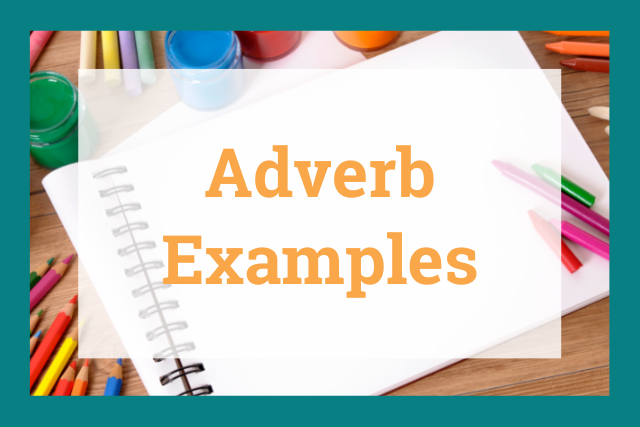
Adverbs are words that modify other words or phrases, besides nouns, in a sentence. People often think that all adverbs end in -ly. While many do, this is not the case for all adverbs.
In this article, you’ll find a list of over three hundred adverbs, along with examples of how to use adverbs in sentences.
Adverb Definition
The definition of an adverb is a word that modifies another part of speech in a sentence. Adverbs often modify verbs, but sometimes they modify adjectives, other adverbs, or even clauses. They do not modify nouns—adjectives do that.
Adverb clauses are phrases of two or more words that function as an adverb. For example, in order to is a conjunctive adverb. The three words work together to make an adverb clause.
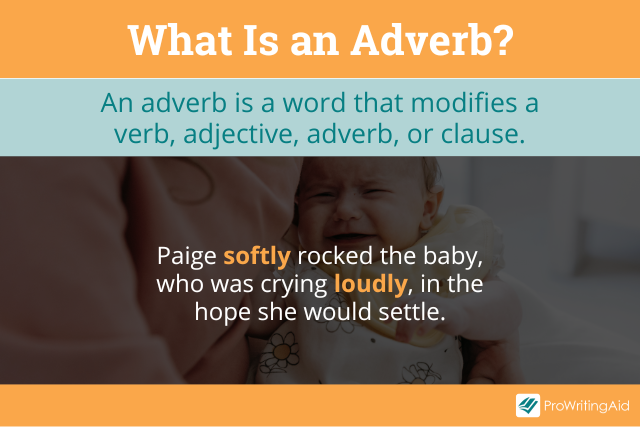
Adverbs Meaning
What does it mean to modify verbs, adjectives, adverbs, or other parts of speech? “Modify” means “change,” but in grammar, we use it to mean adding additional information.
Adverbs can explain how or to what extent something occurs. They can tell you when, where, or how often something happens. Adverbs can even add opinions to sentences.
We use adverbs to clarify, explain, or describe. They express emphasis and help set the scene. Because adverbs can modify other adverbs, we can even combine adverbs to add additional emphasis (e.g. very rarely).
Adverbs don’t always end in -ly, but if you see word ending in -ly, it’s a good clue that you’ve found an adverb.
Take a look at this example sentence:
- She glared coolly at her ex-husband.
The adverb “coolly” modifies the verb “glared.” It tells how she glared.
Here’s an example of how an adverb can modify adjectives:
- The toddler is extremely energetic.
“Energetic” is an adjective. The adverb “extremely” tells us to what degree the toddler is energetic.
Now, let’s look at how adverbs might modify other adverbs.
- She did very well on her Chemistry test.
“Very” and “well” are both adverbs. “Very” tells us how well she did.
Types of Adverbs Examples
Adverbs fall into several categories. These are manner, place, frequency, purpose, time, degree, and evaluation.
These categories are somewhat arbitrary. Different authorities and sources may include only a few of these categories. Some adverbs can fit into more than one category.
We have compiled a list of 312 examples of adverbs below. This is not an exhaustive list—there are hundreds more adverbs in the English language.
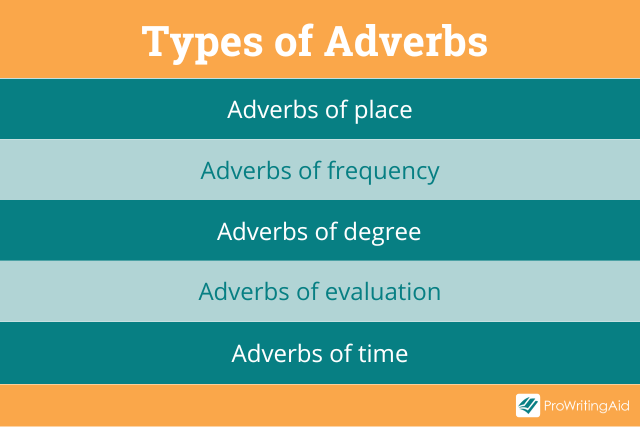
Adverbs of Manner
The most common type of adverb is an adverb of manner. Adverbs of manner describe how something is done or how it occurs. These are often the types of words people think of when they think of adverbs. Most -ly adverbs are adverbs of manner.
Here is a list of 153 adverbs of manner:
- Abnormally
- Absentmindedly
- Accidentally
- Adversely
- Amazingly
- Angrily
- Awkwardly
- Badly
- Beautifully
- Bleakly
- Blindly
- Boldly
- Bravely
- Briefly
- Busily
- Calmly
- Cautiously
- Clearly
- Cleverly
- Commonly
- Cooly
- Correctly
- Cruelly
- Daringly
- Dangerously
- Dastardly
- Dearly
- Deceptively
- Delightfully
- Diligently
- Drearily
- Dumbly
- Eagerly
- Easily
- Energetically
- Evenly
- Excitedly
- Fairly
- Fast
- Fatally
- Ferociously
- Fiercely
- Foolishly
- Freely
- Gently
- Gladly
- Gracefully
- Happily
- Hastily
- Heavily
- Helpfully
- Honestly
- Hopefully
- Hungrily
- Idiotically
- Inadequately
- Innocently
- Intensely
- Irritably
- Jauntily
- Jealously
- Joyfully
- Justly
- Kindly
- Knowingly
- Languorously
- Lazily
- Lightly
- Loftily
- Loosely
- Loudly
- Loyally
- Lovingly
- Madly
- Meanly
- Merrily
- Miserably
- Mysteriously
- Nastily
- Nefariously
- Nervously
- Nicely
- Noxiously
- Noisily
- Obediently
- Oddly
- Openly
- Painfully
- Passively
- Patiently
- Perfectly
- Physically
- Politely
- Poorly
- Promptly
- Properly
- Proudly
- Punctually
- Quaintly
- Quickly
- Quietly
- Rabidly
- Rarely
- Readily
- Reassuringly
- Reluctantly
- Righteously
- Roughly
- Rudely
- Sadly
- Safely
- Searchingly
- Selfishly
- Seriously
- Sharply
- Shrilly
- Shyly
- Sinisterly
- Sleepily
- Smoothly
- Soberly
- Softly
- Stealthily
- Sternly
- Stubbornly
- Stupidly
- Surprisingly
- Sweetly
- Tacitly
- Terribly
- Thankfully
- Tightly
- Timidly
- Truthfully
- Understandingly
- Unhappily
- Unwillingly
- Upbeat
- Uselessly
- Vaguely
- Vainly
- Verbally
- Viciously
- Violently
- Voraciously
- Wanly
- Warmly
- Wetly
- Widely
- Willingly
- Wonderfully
- Yearningly
- Zestily

Adverbs of Place
Adverbs of place tell where something occurs. These are also called spatial adverbs. Adverbs of place don’t usually end in -ly.
Some adverbs of place might be directional, while others may deal with distance or position. Many adverbs of place can also be prepositions in some situations.
However, when these words modify verbs or verb phrases, they function as adverbs.
Here are some adverb of place examples:
- Above
- Around
- Back
- Backward
- Below
- Close
- Close by
- Down
- East
- Eastward
- Everywhere
- Far
- Far away
- Forward
- Here
- Left
- Near
- Nearby
- North
- Northeast
- Northwest
- On
- Onward
- Out
- There
- Outside
- Right
- South
- Southeast
- Southwest
- There
- Under
- Underneath
- Up
- Upward
- West
- Westward
Adverbs of Frequency
Adverbs of frequency are adverbs that tell us how often something occurs. Sometimes, adverbs of frequency end in -ly, but not always.
Let’s look at some examples of adverbs of frequency.
- Again
- Always
- Annually
- Biannually
- Bimonthly
- Biweekly
- Daily
- Frequently
- Generally
- Hourly
- Monthly
- Never
- Normally
- Occasionally
- Often
- Quarterly
- Rarely
- Seldom
- Sometimes
- Typically
- Usually
- Weekly
- Yearly
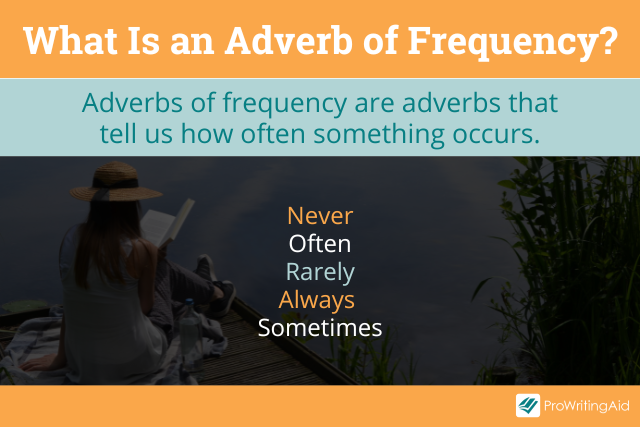
Adverbs of Purpose
Adverbs of purpose are also called adverbs of reason or conjunctive adverbs. They connect two clauses.
When you use an adverb of purpose, you turn one clause into a modifier. The adverb modifies an entire clause. These adverbial clauses help explain why something happens.
Adverbs of purpose can be one word or a phrase. Here are some examples of these types of adverbs:
- Accordingly
- Also
- Anyway
- Because
- Besides
- Certainly
- Consequently
- Finally
- Furthermore
- Hence
- However
- In addition
- In fact
- In order to
- Incidentally
- Indeed
- Instead
- Lately
- Likewise
- Meanwhile
- Moreover
- Nevertheless
- Next
- Nonetheless
- Now
- Otherwise
- Rather
- Similarly
- Since
- Still
- Subsequently
- Then
- Thereby
- Therefore
- Thus
Adverbs of Time
Adverbs of time modify verbs and other parts of speech to explain when something happens. These differ from frequency adverbs, which focus on how often something occurs, although there is some overlap.
For example, annually is considered both an adverb of time and an adverb of frequency.
- After
- Before
- Last week/month/year
- Later
- Next week/month/year
- Now
- Only
- Recently
- Sometime
- Soon
- Tomorrow
- Yesterday
- Yet
Adverbs of Degree
Adverbs of degree explain to what extent something occurs. This is similar to adverbs of manner, but it instead focuses on the intensity of something. Adverbs of degree often end in -ly.
Adverbs of degree often modify adjectives, although they can modify verbs as well. Here is a list of some adverbs of degree:
- Almost
- Absolutely
- Barely
- Completely
- Decidedly
- Deeply
- Enough
- Enormously
- Especially
- Even
- Extremely
- Greatly
- Hardly
- Fairly
- Forcefully
- Fully
- Incredibly
- Intensely
- Least
- Little
- Just
- Most
- Nearly
- Perfectly
- Positively
- Practically
- Purely
- Quite
- Rather
- Really
- Scarcely
- Simply
- So
- Somewhat
- Terribly
- Thoroughly
- Too
- Totally
- Tremendously
- Very
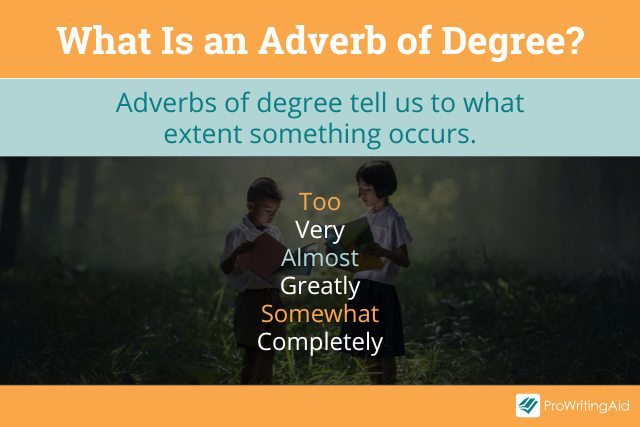
Adverbs of Evaluation
Adverbs of evaluation, also called commenting adverbs, offer commentary or judgment. These words are subjective and can relate opinions or degrees of certainty.
Here are some examples of adverbs of evaluation:
- Actually
- Apparently
- Clearly
- Frankly
- Fortunately
- Hopefully
- Luckily
- Sadly
- Thankfully
- Unbelievably
- Unfortunately
Adverb Examples in Sentences
Now, let’s use some of our examples of adverbs in sentences.
First, let’s start with some adverbs of manner.
- The new hire accidentally deleted everything off the shared drive.
- The seventh-grade boy leaned in awkwardly for a kiss from his crush.
- I cannot believe how beautifully she painted the backdrop for the play.
- Briefly describe your work experience in your cover letter.
- After getting glasses, he could see clearly for the first time ever.
- I love you dearly even after twenty years together.
- He reached his hands eagerly into the cookie jar.
- The writer foolishly did not back up her manuscript, and the power went out.
- She snarled jealously at the woman hitting on her spouse.
- The girl entered the stage nervously and began to sing.
- If you’re not going to fold the towels properly, don’t do it at all.
- The man, who answered the phone rudely, said my RV was too old to stay there then hung up on me.
- The new member timidly took a seat near the back of the group.
- After the race, we voraciously ate a huge brunch.
Now, here are some examples of adverbs of place:
- The kids like to go down the slide backward.
- The toddler snuggled close to his mom for story time.
- Can you move down a few seats to make room for us?
- He moved back east after attending college in Los Angeles.
- We searched everywhere for my lost wallet, but we never found it.
- She just got here from out of town.
- I wish my best friend still lived nearby.
- Please play outside if you’re going to scream!
- Did you look over there for Easter eggs?
- The roller coaster traveled upward at nearly a 90 degree angle.
Next, let’s take a look at some adverbs of frequency.
- We always have tamales on Christmas Day.
- My company does performance reviews bi-annually.
- He frequently misses his exit because he’s listening to an exciting audiobook.
- On the weekends, my parents generally spend time with their friends.
- Do you get paid hourly?
- I hope you never have to witness something traumatic.
- Occasionally, we like to splurge on a fancy meal.
- So, do you come here often?
- The teacher rarely smiles at her students.
- The news seldom tells the whole story of what happened.
- On Mondays, I typically have a 10 a.m. meeting.
- Is she usually this late or is this out-of-character for her?
Next up are adverbs of purpose. These act like conjunctions but explain why something happened.
- The burger is not good. In fact, it’s one of the nastiest things I’ve ever eaten.
- In order to make a good first impression, I woke up early to do my hair and makeup.
- We were several points behind in the last quarter; nonetheless, we tried our best to win.
- Since it’s getting cold outside, I packed away all my shorts and tank tops.
- The train was running late; thus, I didn’t get to buy coffee.
Here are some examples of adverbs of time:
- We’ll attend the movie after we go to dinner.
- The family went on vacation to Florida last year.
- Do you want to go swimming later with me?
- Our boss is expecting everyone to get a large bonus next year since we hit our annual goals.
- I recently attended an incredible performance of the opera La Traviatta.
- I know my phone is somewhere in my house, but where?
Next, let’s look at some examples of adverbs of degree, which tell us about the intensity of something that occurred.
- He almost fooled me with that silly magic trick!
- These new shoes barely fit me, even though they’re my size.
- She was completely enamored by the beautiful visitor.
- My favorite thing about my brother is how deeply he cares for his family.
- According to the song in Beauty and the Beast, Gaston is “especially good at expectorating.”
- The students greatly admired their history teacher.
- Are you working hard or hardly working?
- He studied just hard enough to pass the exam.
- This is the most delicious carrot cake I’ve ever had!
- The children were practically shaking with excitement on the way to Disney World.
- The latest Marvel movie was quite good.
- She is somewhat concerned about fitting in at her new job.
- I am too angry to respond to this email right now.
Finally, here are some sentences with adverbs of evaluation:
- He was not actually telling the truth when he said he bought a house.
- This hotel is apparently rated five stars.
- We clearly misunderstood the instructions in this recipe.
- Frankly, I think you’re making a terrible decision.
- She is fortunately going to pull through her battle with cancer.
- Sadly, we will not be able to attend your wedding.
- The water is unbelievably cold, even though it’s June!
How to Use Adverbs
You can use adverbs in your writing to explain, add information, or emphasize a point. They can modify adjectives, adverbs, verbs, phrases, and clauses.
Use adverbs of manner and adverbs of degree sparingly. Instead, focus on using strong verbs in your writing. When you use one of these adverbs, focus on specific or colorful ones, instead of overused ones like “very.”
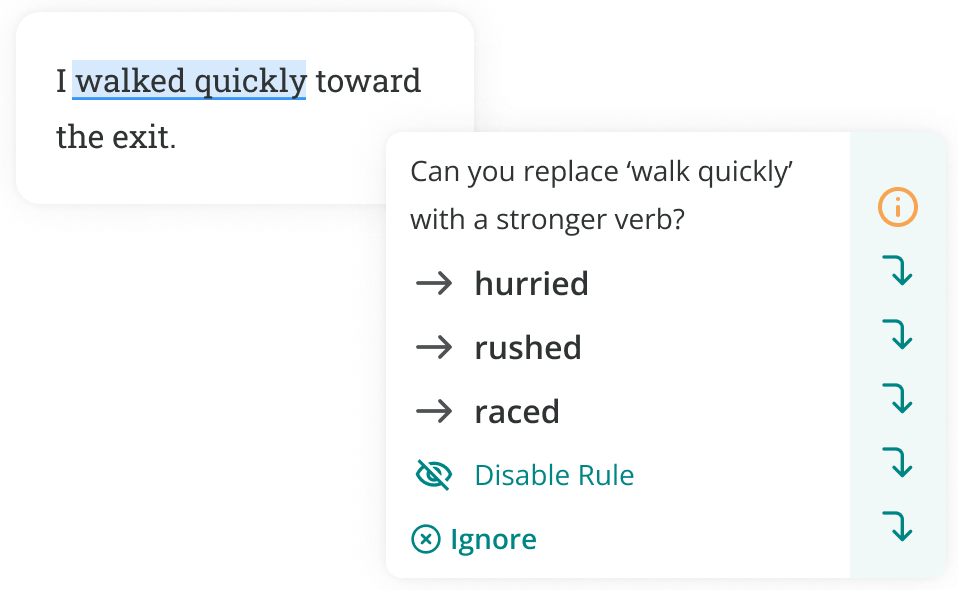
If you’re searching for new adverbs to use, you can use ProWritingAid’s built-in thesaurus. Simply click on a word to see a list of synonyms.


